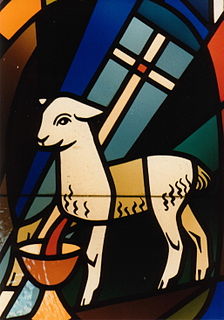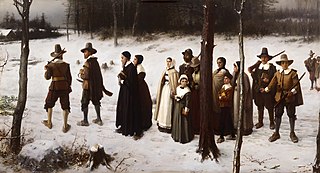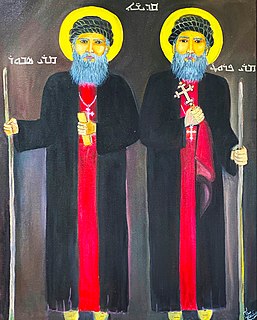
Calvinism is a major branch of Protestantism that follows the theological tradition and forms of Christian practice set down by John Calvin and other Reformation-era theologians. It emphasises the sovereignty of God and the authority of the Bible.

Pietism, also known as Pietistic Lutheranism, is a movement within Lutheranism that combines its emphasis on biblical doctrine with an emphasis on individual piety and living a vigorous Christian life. It is also related to its non-Lutheran Radical Pietism offshoot that either diversified or spread into various denominations or traditions, and has also had a contributing influence over the interdenominational Evangelical Christianity movement.

Christian Church is an ecclesiological term referring to what different Christian denominations conceive of as being the true body of Christians or the original institution established by Jesus. "Christian Church" has also been used in academia as a synonym for Christianity, despite the fact that it is composed of multiple churches or denominations, many of which hold a doctrinal claim of being the "one true church", to the exclusion of the others.

A Christian denomination is a distinct religious body within Christianity that comprises all church congregations of the same kind, identifiable by traits such as a name, particular history, organization, leadership, theological doctrine, worship style and sometimes a founder. It is a secular and neutral term, generally used to denote any established Christian church. Unlike a cult or sect, a denomination is usually seen as part of the Christian religious mainstream. Most Christian denominations self-describe as Churches, whereas some newer ones tend to use the terms churches, assemblies, fellowships, etc., interchangeably. Divisions between one group and another are defined by authority and doctrine; issues such as the nature of Jesus, the authority of apostolic succession, biblical hermeneutics, theology, ecclesiology, eschatology, and papal primacy may separate one denomination from another. Groups of denominations—often sharing broadly similar beliefs, practices, and historical ties—are sometimes known as "branches of Christianity". These branches differ in many ways, especially through differences in practices and belief.
Via media is a Latin phrase meaning "the middle road" and is a philosophical maxim for life which advocates moderation in all thoughts and actions.

A united church, also called a uniting church, is a church formed from the merger or other form of church union of two or more different Protestant Christian denominations.

P'ent'ay is an originally Amharic–Tigrinya language term for Pentecostal and other Eastern-oriented Protestants within Ethiopia and Eritrea, and the Ethiopian and Eritrean diaspora. Today, the term refers to all Evangelical Protestant denominations and organisations in Ethiopian and Eritrean societies as Ethiopian–Eritrean Evangelicalism or the Ethiopian–Eritrean Evangelical Church. Sometimes the denominations and organizations are also known as Wenigēlawī.
Protestantism originated from the Protestant Reformation of the 16th century. The term Protestant comes from the Protestation at Speyer in 1529, where the nobility protested against enforcement of the Edict of Worms which subjected advocates of Lutheranism to forfeit of all their property. However, the theological underpinnings go back much further, as Protestant theologians of the time cited both Church Fathers and the Apostles to justify their choices and formulations. The earliest origin of Protestantism is controversial; with some Protestants today claiming origin back to people in the early church deemed heretical such as Jovinian and Vigilantius.

The term Evangelical Catholic is used in Lutheranism, alongside the term Augsburg Catholic, with those calling themselves Evangelical Catholic Lutherans or Lutherans of Evangelical Catholic churchmanship stressing the catholicity of historic Lutheranism in liturgy, beliefs, practices, and doctrines. Evangelical Catholics teach that Lutheranism at its core "is deeply and fundamentally catholic". The majority of Evangelical Catholic Lutheran clergy and parishes are members of mainstream Lutheran denominations.

The term Eastern Protestant Christianity encompasses a range of heterogeneous Protestant Christian denominations that developed outside of the Occident, from the latter half of the nineteenth century, and yet keep elements of Eastern Christianity, to varying degrees. Some of these denominations came into being, when existing Protestant churches adopted reformational variants of Eastern and Oriental Orthodox liturgy and worship. Some others are the result of reformations of Orthodox beliefs and practices, inspired by the teachings of Western Protestant missionaries. Some Eastern Protestant Churches are in communion with similar Western Protestant Churches. However, Eastern Protestant Christianity does not constitute a single communion. This is due to the diverse polities, practices, liturgies and orientations of the denominations which fall under this category.

Protestantism is one of the six approved religions in Indonesia, the others being Islam, Roman Catholicism, Hinduism, Buddhism, and Confucianism. It constitutes the bulk of Christianity in Indonesia, which is the second largest religion in the country after Islam. According to CIA statistic, in 2000 5.7% of the population of Indonesia were Protestant. A nationwide census of 2018 noted that 7.6% (20,250,000) of the population considering themselves Protestant, largest in Southeast Asia.

The following outline is provided as an overview of and topical guide to Christianity:

Protestantism is a form of Christianity that follows the tenets of the Protestant Reformation: a major movement within Western Christianity that began in the 16th century against what its followers perceived to be errors, abuses, innovations, discrepancies, and theological novums within the medieval Catholic Church.

Protestantism is the largest grouping of Christians in the United States, with its combined denominations collectively comprising about 43% of the country's population in 2019. Other estimates suggest that 48.5% of the U.S. population is Protestant. Simultaneously, this corresponds to around 20% of the world's total Protestant population. The U.S. contains the largest Protestant population of any country in the world. Baptists comprise about one-third of American Protestants. The Southern Baptist Convention is the largest single Protestant denomination in the U.S., comprising one-tenth of American Protestants. Twelve of the original Thirteen Colonies were Protestant, with only Maryland having a sizable Catholic population due to the Lord of Baltimore's religious tolerance.
Sola gratia, meaning by grace alone, is one of the five solae and consists in the belief that salvation comes by divine grace or "unmerited favor" only, not as something earned or deserved by the sinner. It is a Christian theological doctrine held by some Protestant Christian denominations, in particular the Lutheran and Reformed traditions of Protestantism, propounded to summarise the Protestant Reformers' basic soteriology during the Reformation.

Churches in India is a general term used for Christian churches in India and may refer to:
Brethren is a name adopted by a wide range of mainly Christian religious groups throughout history. The largest movement is Anabaptist.










